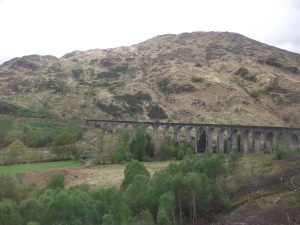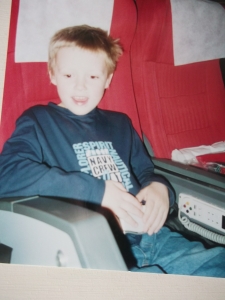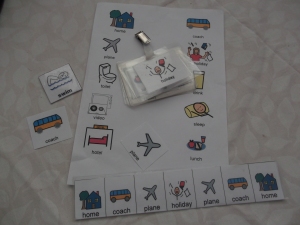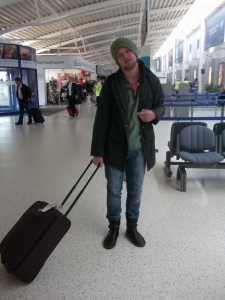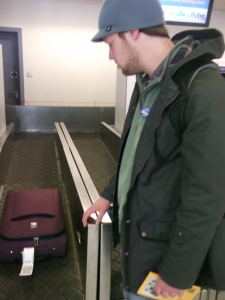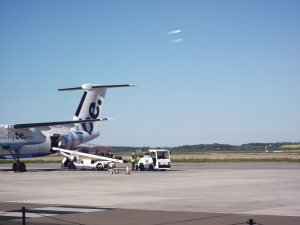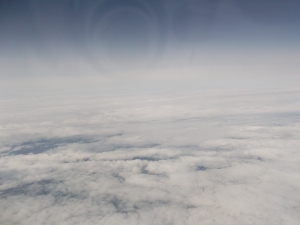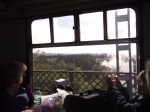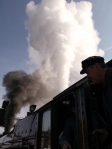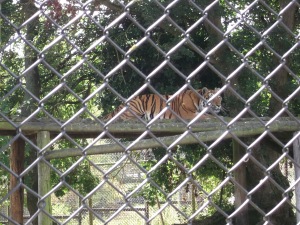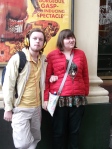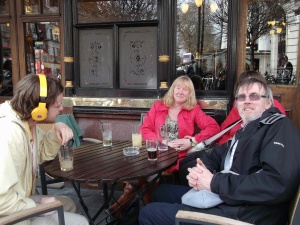Routine is important for Dylan, but he also responds to variety. Routines can be comforting, but the more routinised Dylan’s care is, the more scope there is for Dylan to become upset when things don’t happen as he expects. Much better, perhaps, to surprise Dylan with a new experience about which he has no expectations and around which no routines have had chance to form. This Christmas I was reminded of some of the benefits of that.
Chatsworth House
 On the run up to Christmas, Dylan started collecting leaflets for ‘Christmas at Chatsworth’. Dylan makes piles of leaflets to show us what he’d like to do. They’re his way of putting in a request. It took me a while to realise this is why Dylan picks up leaflets when we’re out and about, but once I did it made good sense. Now, Dylan has his own leaflet rack in his apartment, where he can sort and store flyers and brochures.
On the run up to Christmas, Dylan started collecting leaflets for ‘Christmas at Chatsworth’. Dylan makes piles of leaflets to show us what he’d like to do. They’re his way of putting in a request. It took me a while to realise this is why Dylan picks up leaflets when we’re out and about, but once I did it made good sense. Now, Dylan has his own leaflet rack in his apartment, where he can sort and store flyers and brochures.
When I looked at the ‘Christmas at Chatsworth’ leaflet I had my doubts. The event involved a tour of the House, a Christmas Market, and an illuminated garden walk. While the event looked lovely, it wouldn’t fit with Dylan’s routines. We are regular visitors to the Chatsworth estate, but Dylan’s routine doesn’t include the House. The illuminated walk around the gardens would almost certainly not follow Dylan’s usual route. What if the Maze was closed? The café would be too busy or not serving Dylan food. The Market Stalls would be noisy with people. It was after dark. Really, there was nothing to recommend it.
But feeling brave one morning I booked tickets anyway. I was sceptical about our allotted 18.15 admission to the House (teatime) and unsure how long to allocate for pre-House activities. With transitions between activities needing to be smooth and perfectly timed, I approached the event with low expectations and some trepidation. However, it was a perfect evening. There is something about the dark, perhaps, which helps us try new things. Dylan adored the outdoor Market. He danced to a rag ‘n’ skiffle band, browsed the market stalls, and enjoyed a street food tea. He followed the illuminated walk happily, even though it ran counter to his usual route and omitted his favourite places. Other things seemed to become magically possible for him: Dylan stood for a long time watching a sound and light show unfold a storybook narrative on the façade of the House.
Inside the House, Dylan made his way through the rooms in amazement, lingering over paintings and staircases, eyes popping at the advent decorations hanging from ceilings and walls. We’ll come back soon, I promised Dylan, as I encouraged him from the House. I suspect we’ll also return next Christmas: from such experiences, Dylan’s routines form!
Disney on Ice
 A change of email address meant I didn’t get the usual notification for Disney on Ice and by the time I’d realised there were few options left. The idea that Dylan wouldn’t go was unthinkable: all year, driving past the Sheffield Arena, he reminds me. I spent a frantic hour on the website. There were a few likely seats, but I couldn’t see a way of booking Disabled and Carer, as I usually do. Why is it that these are so often not selectable online? I decided it was more important that I snapped those tickets up while I could. If I kept fiddling with the website, trying to find accessibility options, I risked losing them.
A change of email address meant I didn’t get the usual notification for Disney on Ice and by the time I’d realised there were few options left. The idea that Dylan wouldn’t go was unthinkable: all year, driving past the Sheffield Arena, he reminds me. I spent a frantic hour on the website. There were a few likely seats, but I couldn’t see a way of booking Disabled and Carer, as I usually do. Why is it that these are so often not selectable online? I decided it was more important that I snapped those tickets up while I could. If I kept fiddling with the website, trying to find accessibility options, I risked losing them.
The only problem, I realised after, is that I hadn’t been able to book disabled parking for Dylan. Our routine, each year, has been that we drive to the Arena and have a pre-show meal in Bella Italia. Dylan loves this, it seems, as much as the ice dancing. ‘Di-ne-i-pas-ta’ he chants when we drive past the Arena. But Disney on Ice with pasta is dependent on precise timings and transitions which I had no intention of attempting to orchestrate without a parking space. What was I to do? I decided we would use the tram. Although the logistics meant there would be no meal, I hoped the novelty of a tram ride would be compensation enough. Happily, this proved the case. Dylan’s joy on the tram was a joy to witness.
We can get ourselves boxed into over-preparing for a vulnerable adult. It’s great to have the option of Blue Badge parking and useful to have access to private transport when things go wrong. Essential, you could say, when a vulnerable person becomes distressed while out and about in the community. However, it can also limit the opportunities for joy. I suspect I may hear a new song this year when we drive-by the Arena: ‘Di-ne-i-tram’.
Polar Express
 Over-preparing may have its shortcomings but so does under-preparing. I accused myself of this on the platform at Sheffield station, waiting for a train to Birmingham, Dylan flapping with excitement on my arm. I had only just noticed that our tickets didn’t include reserved seats. I’d been so keen to save money I’d selected an offer which left seats open. Friday, late afternoon, on the most popular office party day of the year. How foolish of me.
Over-preparing may have its shortcomings but so does under-preparing. I accused myself of this on the platform at Sheffield station, waiting for a train to Birmingham, Dylan flapping with excitement on my arm. I had only just noticed that our tickets didn’t include reserved seats. I’d been so keen to save money I’d selected an offer which left seats open. Friday, late afternoon, on the most popular office party day of the year. How foolish of me.
Dylan had been collecting leaflets again. Like many childlike souls, Dylan is obsessed with the Polar Express. Let me see that, Dylan, I said to him one day, when he greeted me clutching a wad of flyers. ‘Press’ he said (meaning Polar Express). But this is for Birmingham, I exclaimed. Too far away. Sorry. No. But Dylan kept finding these leaflets somewhere. Every time I picked him up he came clutching a thicker wad of Polar Express leaflets. Call me soft but after one home visit, when he’d carried the leaflets with him everywhere, I relented.
Perhaps I booked the tickets at high speed before I changed my mind? I remember it was quite complex. Tickets for the Polar Express ride on Saturday morning. A Premier Inn booking for the night before. Pizza Hut reservation for tea. Return rail Sheffield to Birmingham. Maybe by then I was too weary to check the T & Cs. At any rate, here we were on the platform, waiting for what would no doubt be a standing-room only train. I booked the trip believing but didn’t feel so brave now.
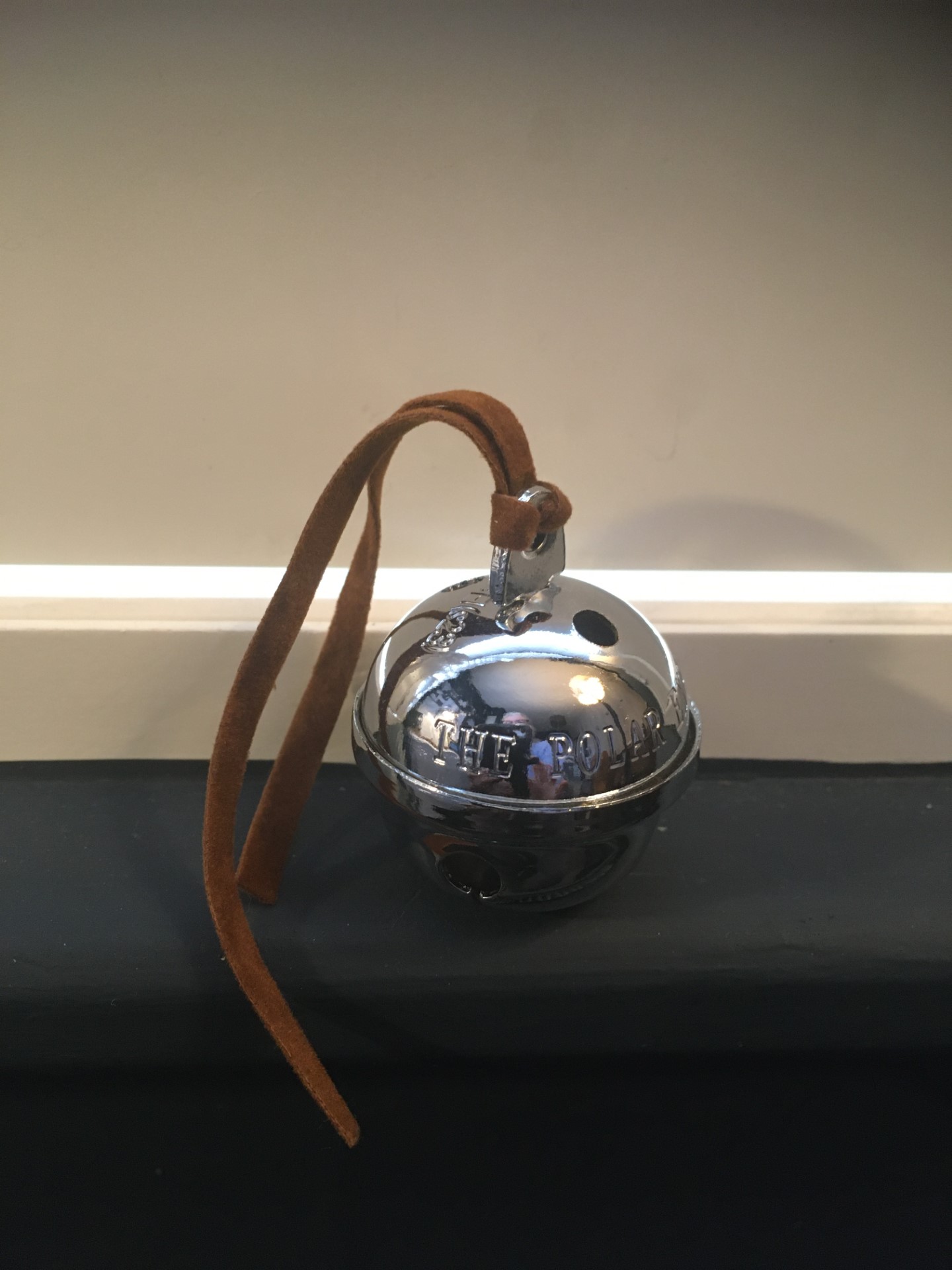 I was wrong not to believe. The truth is British people are lovely. I’m sure people are lovely everywhere but let me celebrate the British public on the train that day, and particularly the woman in the powder blue coat who swapped her seat to make space for us. Also, the couple on the even-more-packed Birmingham to Sheffield train the next day who let us have their seats because they were ‘only going as far as Derby’. Blessings on you lovely people. And let me never forget that nine times out of ten, when I’m out and about with Dylan, members of the public are understanding, helpful and kind.
I was wrong not to believe. The truth is British people are lovely. I’m sure people are lovely everywhere but let me celebrate the British public on the train that day, and particularly the woman in the powder blue coat who swapped her seat to make space for us. Also, the couple on the even-more-packed Birmingham to Sheffield train the next day who let us have their seats because they were ‘only going as far as Derby’. Blessings on you lovely people. And let me never forget that nine times out of ten, when I’m out and about with Dylan, members of the public are understanding, helpful and kind.
The train journeys there and back would have been exciting enough for Dylan, by themselves, but these were only the bookends of our trip. We arrived in Birmingham to find the biggest Christmas Market ever. The city centre was a heaving sea of people. Dylan held tight to my hand as if in a dream. We rode the carousel and big wheel, ate pizza, walked canal towpaths, and stood for over an hour watching people ice skating, Dylan laughing and shouting: Whoops, Whoops, O Dear!
Arriving at Moor Street Station for the Polar Express ride the next day, I was amused to discover we were virtually the only people not wearing pyjamas. A humongous queue. Lots of little people. Maybe this wasn’t such a good idea. Except beside me, Dylan was waiting patiently. ‘Press!’ ‘Press!’ he shouted, squeezing my hand. Against all odds I would have hazarded, Dylan stood in that long line until we were through the barrier, then danced to the live music and song while we waited to be boarded.
Believe in what you feel inside
And give your dreams the wings to fly
You have everything you need
If you just believe
On the train, they were handing out cookies and hot chocolate. My son won’t drink his, I said. Still, they poured him some. Dylan transferred it into the ceramic mug he’d been given. Careful, I said. It’s hot. Dylan paid attention to the actors and dancers, listened to the story, and helped turn the big book pages. He ate my cookie and shouted ‘Steam! Steam!’ as our window turned white. What was there not to like? Only the hot chocolate, really.
Hot! Hot!
Ooh, we got it!
Hot! Hot!
Hey, we got it!
Hot! Hot!
Say, we got it!
Hot chocolate!
Why don’t you try it, Dylan, I said. It’s only chocolate milk. Leave it to cool if you want. And to my surprise, Dylan picked up his Polar Express mug and drank it up. Back at Moor Street, with time to spare before our journey home, I headed back to the Christmas Market. There was something I needed to check. Come on Dylan, I said. I’d seen people walking around with little red cups earlier. I hunted down the stall. Hot chocolate, Dylan, I said. To my amazement, he drank it. At almost 30, Dylan has added a hot drink to his repertoire.
The Sea
 Between Christmas and New Year my car let me down twice. I had to wait two hours for recovery from the short stay car park at the railway station where I’d gone to say goodbye to my daughter, returning to London. Freezing. Hungry. No money. Miserable. At least I didn’t have Dylan with me, I told myself. A couple of days later, when I left my friend’s almost new year party, my car wouldn’t start again. I abandoned it and got a cab. At least I wasn’t with Dylan, I told myself.
Between Christmas and New Year my car let me down twice. I had to wait two hours for recovery from the short stay car park at the railway station where I’d gone to say goodbye to my daughter, returning to London. Freezing. Hungry. No money. Miserable. At least I didn’t have Dylan with me, I told myself. A couple of days later, when I left my friend’s almost new year party, my car wouldn’t start again. I abandoned it and got a cab. At least I wasn’t with Dylan, I told myself.
And then I realised I might be. Dylan and I always go to the coast for New Year. It’s what I call a tradition (rather than a routine). Cleethorpes, in Lincolnshire, happens to be the nearest sea to Sheffield so that’s where we go. We walk the coastal path to the Humberston Fitties where Dylan checks on all his favourite chalets before heading back to town for a chip supper. The thought of Dylan and I stranded in Cleethorpes preoccupied me the whole of the next day, even when my friend assured me he’d found and fixed my car problem. And then, a solution. If Dylan had accepted Disney on Ice by tram, perhaps he would accept Cleethorpes by train? Providing, I told myself, I could reserve seats.
On the website, I found something even better: First Class tickets at a not unreasonable cost. So, we travelled in style through fields of dykes and winter cabbages under a bright sky, the carriage to ourselves and Dylan in his element listening to Adele on his iPad and admiring the curtain at our window and the table lamp, while I got to relax. On the return journey I vowed that (providing the prices weren’t silly) I would always book First Class when travelling with Dylan in future. The next day, however, hundreds of people were reported to be stranded at Doncaster Station as the line was flooded, and services cancelled. First Class rail might be better than driving, but only if the trains are running. It seems we got lucky.
*
The things Dylan and I enjoyed most this holiday season were twists on familiar activities or new experiences which required one or both of us to be a bit brave. These might seem like very small challenges, but if your needs are as complex as Dylan’s then they are enormous achievements. This Christmas, Dylan tasted his first hot chocolate. That it’s still possible to introduce Dylan to new experiences and activities gives me hope.
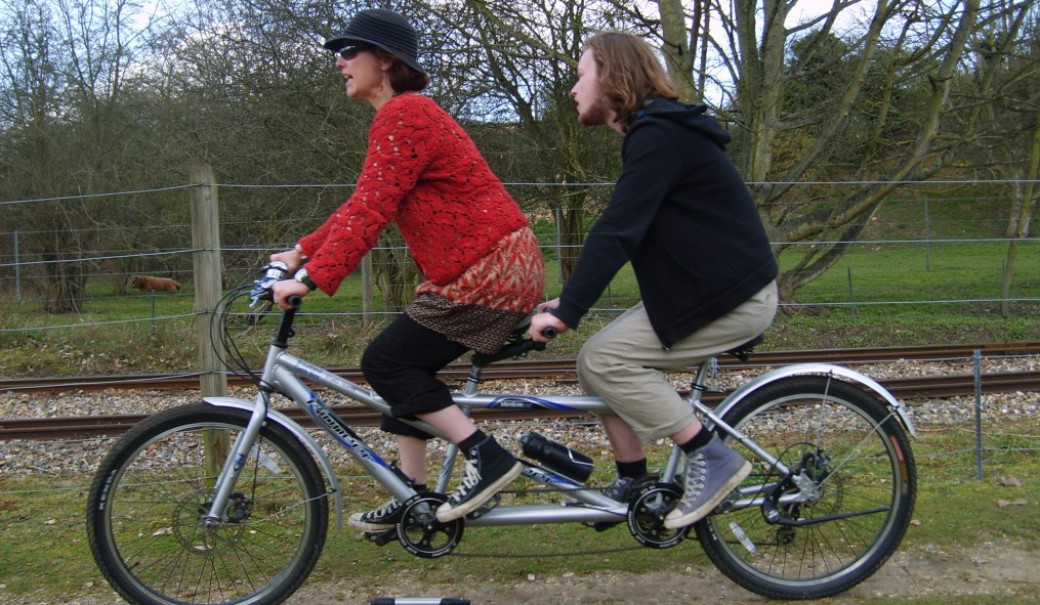

 I had the idea to take Dylan to the Isle of Man after reading that it was the basis for the Thomas the Tank Engine stories. The Isle of Man forms the Diocese of ‘Sodor and Man’ and the island’s Bishop is known as ‘Bishop of Sodor and Man’. There is, however, no island of Sodor; the name is Old Norse and refers to the Scottish Hebrides which were once part of ‘The Kingdom of Mann and the Isles’ but over which the Bishop no longer has authority. The Reverend W Awdry modelled his fictional Island of Sodor on the Isle of Man, inspired by holidays he spent there as a child.
I had the idea to take Dylan to the Isle of Man after reading that it was the basis for the Thomas the Tank Engine stories. The Isle of Man forms the Diocese of ‘Sodor and Man’ and the island’s Bishop is known as ‘Bishop of Sodor and Man’. There is, however, no island of Sodor; the name is Old Norse and refers to the Scottish Hebrides which were once part of ‘The Kingdom of Mann and the Isles’ but over which the Bishop no longer has authority. The Reverend W Awdry modelled his fictional Island of Sodor on the Isle of Man, inspired by holidays he spent there as a child.
































